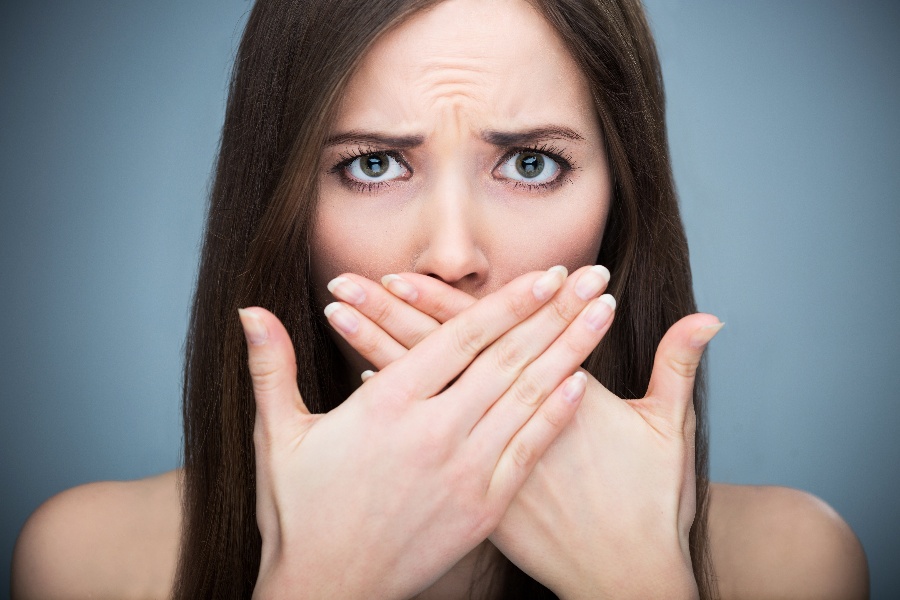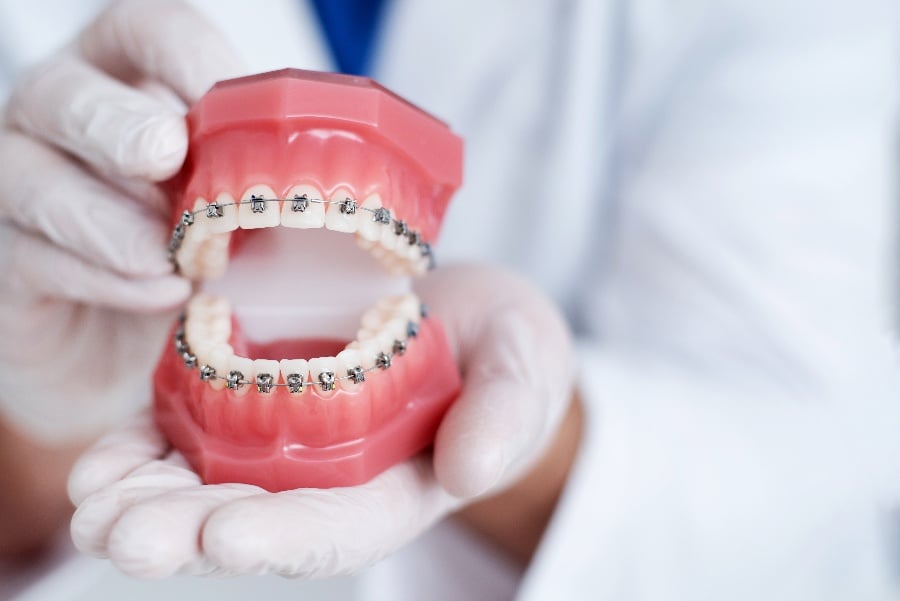However, many people are chronically aware of foul-smelling breath that they cannot eliminate by using mints or mouthwash. Because this condition is so common, dentists are accustomed to effectively diagnosing and successfully eliminating most cases.
What is Halitosis?
Bad breath can be temporary, such as the malodor everyone has the first thing in the morning or after eating certain foods. However, halitosis is typically considered a condition of longstanding bad breath caused by a medical or dental condition.
Bad breath is a common condition for males and females that affects more than half of the population. Those with halitosis usually report that it has negative psychological and social impacts on their daily life. For example, bad breath can adversely affect your self-image and diminish your self-confidence. Additionally, the odor of your breath can lead to withdrawal from social interactions and loss of intimate relationships. The magnitude of bad breath’s effect on well-being makes halitosis a serious condition that calls for immediate diagnosis and treatment.
Causes of Bad Breath
Some cases of bad breath are the result of diet. Foods such as durian fruit, loved by celebrity chef Anthony Bourdain, leave your breath so foul that it is banned from hotels in some countries. Likewise, stinky tofu should give you caution before attending a business or social meeting. Other foods such as garlic or sauerkraut offer health advantages that may be worth consuming occasionally as long as you take into account their effect on your breath.
Besides these types of foods there are causes of halitosis that originate from the oral cavity or extraoral sources. Unlike bad breath caused by foods, these cases will not resolve without specific interventions.
Bad Breath Originating From The Oral Cavity
The mouth is the source of 90% of cases of bad breath. This is because your mouth provides an optimal environment of warm temperatures and high humidity for the hundreds of species of bacteria to produce odorous compounds. Adding to this complex environment is the challenge of food decomposition without rigorous oral hygiene. The following oral cavity factors can contribute to halitosis:
- Tooth decay. Tooth decay creates tiny holes in tooth enamel where bacteria can accumulate, destroying the underlying tooth structure. Bacteria that accumulate in these cavities are difficult to remove with brushing and flossing and produce noxious odors. Tooth decay beneath older fillings or crowns can be especially troublesome because of their hidden location. These cavities will require dental radiographs to identify.
- Gum disease. Bacteria found in dental plaque cause gum inflammation and produce sulfur compounds that cause bad breath. This breath worsens as periodontal disease progresses and results in a distinctive odor known as perio breath.
- Dry mouth. Healthy salivary flow is a vital part of optimal oral health. Saliva rids the mouth of decomposed cells found on the tongue, cheeks, and gingiva. It also helps wash away food after eating and acts as a buffer to neutralize dental plaque and the acidity of most people’s diet. Without adequate saliva, bacteria multiply and produce bad breath.
- Smoking and tobacco products. One of the side effects of smoking is smoker's breath. Although not as severe as its other effects on the body, it has the same adverse consequences as other causes of longstanding halitosis. Besides the stale scent left behind from a mouth full of smoke, particles containing noxious chemicals attach to teeth, gums, tongue, and cheeks that produce bacteria. Additionally, smoking causes dry mouth, which exacerbates bad breath.
- Dental infections. An abscessed tooth needing root canal therapy can drain into your mouth to create persistent bad breath. Another possible dental cause of halitosis is a condition known as pericoronitis. This occurs when the gums covering a partially impacted wisdom tooth become infected.
Bad Breath Originating From Extra-Oral Sources
Although the mouth accounts for most cases of halitosis, approximately 10% are caused by other sources. These include:
- Respiratory system problems such as sinusitis, bronchitis, and pneumonia.
- Gastrointestinal system problems such as reflux (GERD), stomach ulcers, and irritable bowel syndrome.
- Liver and kidney diseases that interfere with the elimination of bodily toxins.
Diagnosing Halitosis
An assessment of bad breath begins with your dentist. Sophisticated tests exist to help diagnose persistent bad breath, but these are rarely needed. Instead, most cases can be accurately diagnosed by a thorough oral examination that might include various dental radiographs and a complete periodontal examination.
Solutions for Halitosis
The most important part of successfully treating bad breath is accurately detecting its cause. The good news about bad breath is that once your dentist makes this determination, your halitosis can probably be eliminated by reducing or eradicating the odor-causing bacteria. Dental solutions for bad breath might include one or more of the following:
- Professional teeth cleaning to eliminate gingivitis.
- Deep cleaning to treat periodontal disease.
- Periodontal therapy, such as gum surgery or laser treatment to eliminate pockets where bacteria can accumulate.
- Dental fillings or crowns to remove tooth decay and its contribution to bad breath.
- Root canal therapy to eliminate root canal disease and infection.
- Assessment and treatment of xerostomia (dry mouth). Your dentist may prescribe a medication or other product to help stimulate saliva production. Occasionally, treatments such as salivary gland surgery may be necessary.
- Medical referral if an oral cause cannot be identified.
How To Prevent Bad Breath
You can take several steps to avoid bad breath, such as:
- Brushing your teeth twice daily for two minutes.
- Flossing daily.
- Having regular dental checkups and professional teeth cleanings.
- Changing your toothbrush regularly.
- Thoroughly cleaning around dental appliances such as bridges with floss threaders or other dental devices recommended by your dentist.
- Using a mouthwash recommended by your dentist to reduce odor-causing bacteria.
- Brushing your tongue to remove any bacteria coating its surface.
- Adjusting your diet as necessary to avoid persistent bad breath from foods.
- Avoiding products that dry your mouth, such as tobacco and alcohol.
Schedule an Appointment
If you are concerned about having bad breath, contact us online or call us to schedule an appointment for a comprehensive oral examination and professional teeth cleaning.




